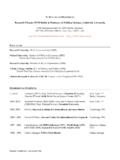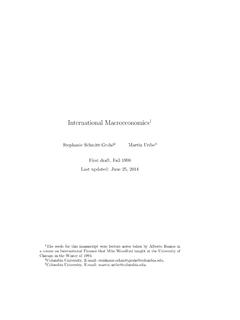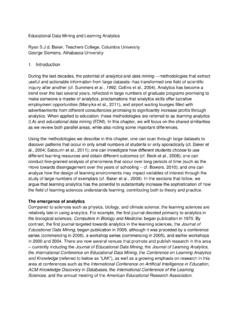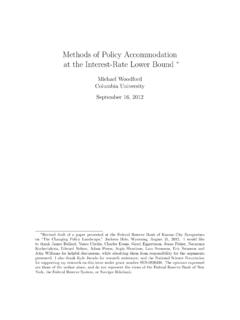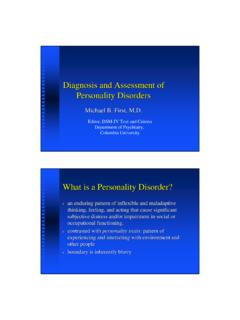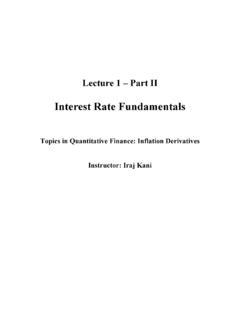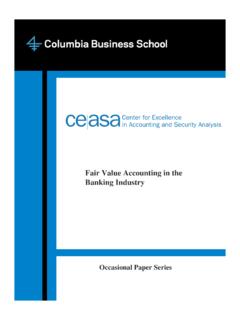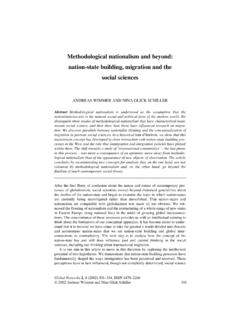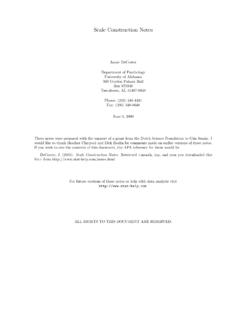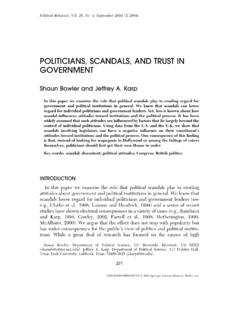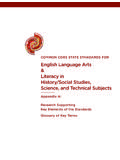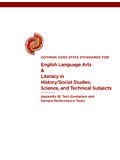Transcription of Political Science and History: Enhancing the ...
1 Political Science and History: Enhancing the MethodologicalRepertoireGregory J. Wawro Ira KatznelsonAssociate ProfessorRuggles Professor of Political Science and HistoryDepartment of Political ScienceDepartments of Political Science and University420 W. 118th York, NY 10027phone: 212-854-8540fax: 212-854-5670 Corresponding author. The authors gratefully acknowledge the research assistance ofQuinn Mulroy, Grant Porter, Josh Savitch, Tiffany Washburn, and Steven Science and History: Enhancing the MethodologicalRepertoireAbstractSeeking to advance historical studies of Political institutions and behavior, we argue foran expansion of the standard methodological toolkit with a set of innovative approaches thatprivilege parameter heterogeneity to capture nuances missed by more commonly used doing, we address critiques by prominent historians and historically-oriented politicalscientists who have underscored the shortcomings of mainstream quantitative approachesfor studying the past.
2 They are concerned that the statistical models ordinarily employedby Political scientists are inadequate for addressing temporality, periodicity, specificity, andcontext issues that are central to good historical analysis. The innovations in method thatwe advocate are particularly well-suited for incorporating these issues in empirical models,which we demonstrate with two replications of extant research. The replications focus onlocating structural breaks associated with reform of legislative rules, and on the temporalevolution in congressional roll-call behavior regarding labor policy during the New Deal andFair IntroductionHow should the craft, logics, and landscape of history be made a constitutive aspect ofpolitical analysis? This question and the complex of issues that inform it have becomepressing as more and more scholarship in Political Science has been taking a historical tack,even in parts of the discipline that long had been oriented to the present or the very recentpast.
3 Historians and historical social scientists often blanch at what they believe to befar too simple and simplifying ways of working on the past by mainstream colleagues(Gaddis 2002; Sewell 2005; Tractenberg 2006; Tilly and Goodin 2006). Demonstrating howsome recent advances in quantitative modeling can engage with, and help resolve, their oftenon-target criticisms, this article contributes to the systematic engagement of Political sciencewith historical materials, and rejects any choice between historical depth and growing number of ambitious accounts trace how processes, including the temporalhorizons of actors, unfold over time. We can see this development in studies of public opinion(Page and Shapiro 1992; Berinsky 2009) and the character and control of regulatory agenciesover the long term in the United States (Moe 1987; Carpenter 2010). Though not whollynew as a research program (Brady 1973; Cooper and Brady 1981), this trend is especiallypronounced in studies of Congress (Binder 1997; Schickler 2000; Wawro and Schickler 2006;Jenkins, Peck, and Weaver 2010).
4 Such scholarship also has become more common amongquantitative and formal students of international relations (Mansfield and Snyder 2005) andcomparative politics (Kalyvas 1996, 2006). Attention to history, the discipline has learned,offers a rich reservoir of information that can be utilized by deductive and quantitative,as well as a range of qualitative, methods, sometimes serving as material with which to testmodels and hypotheses that first were broached in analyses of more current situations (Bates,Greif, Levi, Rosenthal, and Weingast 1998; King, Keohane, and Verba 1994).But therein often lies a problem. History frequently is treated simply as data with theimplicit assumption of an equivalence among facts and particulars found in various periodsand contexts. History, the critics rightly insist, is more than a mere laboratory or depositoryof additional cases for model building and have two primary concerns.
5 Substantively, they think this emergent work misses the2chance to enlarge scholarship s agenda, to ask the most important, difficult, and challenginghistorical questions. Methodologically, they find this scholarship to be naive about the chal-lenges that come with taking history seriously. Without attention to analytical issues posedby temporality, periodicity, specificity, and context, the utilization of historical data, theyargue, paradoxically raises barriers to good historical scholarship, and thus, in the absenceof sufficient methodological self-consciousness, may actually widen a long-standing breachbetween history and Political Science (Katznelson and Lapinski 2006).Wishing to promote this engagement, we seek to build on how some historical institution-alists have been ruminating about how to place politics in time, while mounting their owncriticism of the mainstream discipline for its neglect or mechanical deployment of the past,and for an apparent lack of interest in the most significant large questions about the characterof the polity issues that only can be addressed with a historical sensibility (Pierson 2004;Orren and Skowronek 2004; Pierson and Skocpol 2002).
6 Convinced that there is a tremendous opportunity waiting to be seized, we argue for a setof innovations in methodology that can complement what less formal and more qualitativeresearchers can accomplish, while taking seriously the central themes and epistemologicalconcerns articulated in their critiques and their scholarship. While others have convincinglypointed to flaws in quantitative approaches to history, the literature lacks constructive sug-gestions for how to augment existing methods in order to overcome the shortcomings theyhave identified. Our aim is to demonstrate how methods that were in the main not developedfor historical analysis can offer exactly what critics of such modeling claim is article proceeds as follows. We provide an overview of various criticisms that concernhow Political Science approaches history, proceed to a discussion that contrasts more standardquantitative approaches with promising alternatives, and offer two sets of replications toillustrate their plausibility and advantages.
7 We conclude by suggesting ways to move thisresearch program Skepticism and PossibilityMany historians pay little or no attention to Political Science , thinking its practitionersto be primitive or uncurious about the past. On this view, Political scientists spend too3little time with primary sources in archives or with secondary sources written by these are relatively superficial matters; after all, there is no reason Political scientistscannot exercise more due diligence with historical evidence or broaden their libraries (Kreuzer2010). But some historians who take the social sciences seriously, and who wish, like RichardHofstadter writing a half-century ago, to develop history informed by the insights of thesocial sciences , whose primary purpose will be analytical (Hofstadter 1956, 363), haveposed more fundamental challenges. Such historians know that the two crafts, irrespectiveof an overlap, have distinctive purposes and qualities, and they understand that politicalscientists, within the division of scholarly labor, are less focused on period-specific narrativesof what happened than attuned to theoretical and empirical models fashioned to discerncauses and concerns run both ways.
8 An example is William Sewell sLogics of History(2005).Just as he worries about social scientists who apply models over broad swaths of history inways that risk ignoring changes to context, temporality, and historical specificity, he lamentshow historians often do not attend to theory and methodology, substituting a narrative over-confidence in which the story can mask the absence of a systematic approach to causationor interpretation (Sewell 2005, 11).Sewell s main contribution is to ask us to think more richly about types of distinguishes three kinds. These he calls teleological, in which outcomes are the resultof large-scale processes, beyond events and often beyond agency, like modernization, state-building or capitalist development; experimental, in which time is seen as equivalent and thecomparative method is used to tease out causal parallels across time; and eventful, sensitiveto the context specific intertwining of structure and agency (Sewell 2005, 83).
9 Interestinglydefining events not as anything that happens, but as that relatively rare subclass of hap-penings that significantly transform structures, he stresses a causal dependence of lateroccurrences on prior occurrences and assumes that social causality is temporally heteroge-neous, not temporally uniform (Sewell 2005, 100 101). All three approaches to time, hesays, can be productive, but only if what he calls the eventful approach is integrated withthe others. This kind of history must be particularly attentive to how categories of under-standing and analysis emerge and change at different moments, as meanings are not static4(73ff). From this vantage, negotiation of choices are informed not only by particular contextsand situations but also by particular tools of meaning and understanding that actors havethat are embedded in particular historical at the border between respect and dismissal, John Lewis Gaddis sLandscapes ofHistory(2002) offers an even more challenging assessment by a historian seeking to engagewith the social sciences .
10 Though overstated, his complaints deserve to be taken seriously ascondensed and concentrated versions of reservations held by historians. Gaddis sets out fromthe premise that apprehending history as a whole is impossible. As they seek to connectcauses to consequences, he counsels, historians thus depend on approaches and methods thatcan move back and forth between more literal and more abstract representations of the past,and between generalization and particularization (Gaddis 2002, 12 15). This is exactly thechallenge that confronts historically-oriented Political Science , a challenge he depicts in ametaphor of the tension between maps that depict reality and mapping as an act of choosinghow to simplify in order to show what is real. Such acts perform the work of modeling, andthey range from more to less simplified and from more to less logical as distinct from moreto less empirical.
